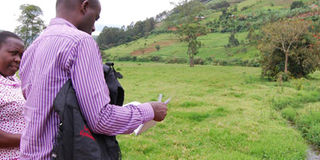Locals accuse Nema of shielding the rich in River Rwizi evictions

Concerned. Nema officials at the degraded section of Kanyabukanja-Katara wetland in Buhweju District last Thursday. PHOTO BY FELIX AINEBYOONA
What you need to know:
- Background. Government is currently evicting residents from River Rwizi catchment areas.
BUHWEJU.
Residents in Buhweju District have accused the National Environment Authority (Nema) of only evicting the poor from wetlands and leaving the rich.
Nema is currently evicting residents from all areas in western Uganda that are major catchments for River Rwizi, which is facing extinction as a result of encroachment.
However, speaking at a meeting in Kalungu Sub-county last Thursday, residents Nema said Nema law enforcers are forcing out of wetlands those growing beans and bananas but have failed to deal with those who have established livestock farms.
“The first problem is that people do not have land where to grow crops. But government has also failed to enforce the law uniformly. They are fighting those who grow beans and matooke in swamps and leave those with grazing. That is what is affecting environmental protection,” said Mr Crescent Musiime, the Rwankondo village chairman in Kasharara Parish.
Hurdles
The district environment officer, Ms Clemensia Birungi, accused a rich man of degrading about 50 hectares of Kanyabukanja- Katara wetland system but that he has refused to vacate.
“Kanyabukanja-Katara wetland system is the main source of River Rwizi but there is a stubborn man who has degraded about 50 hectares of the stream. He has refused to leave,’’ said Ms Birungi.
She added: “We have arrested him and the case was transferred to Bushenyi Chief Magistrate’s Court after the Grade One magistrate complained of political interference. It has been there since September last year.”
Ms Birungis said since 2014 , 50 per cent of Kanyabukanja-Katara wetland system, which covers a distance of 50km, has been degraded by encroachers, mainly dairy farmers.
However, Nema officials Edward Odipio and Hebert Nabaasa insisted that nobody is above the law.
“This guy is masquerading to be bigger than the environment protection force but we are going to handle him. There are also options of leaving voluntarily but if you refuse, we shall be forced to apply force,” said Mr Nabaasa.
He asked people to be patient with Nema, saying they are engaging all stakeholders in the restoration of all fragile ecosystems, a process which will take some time. Mr Odipio acknowledged that limited political support and resources are constraining enforcement of environment laws.
However, he said the compliance agreement approach will help reduce the friction between encroachers and government and restore wetlands. Under the compliance approach, encroachers agree to plant trees in the buffer zone and look after them but also keep using the land. They are supposed to stop using the land after the trees have formed canopy. “What brought us here is to agree with the community to take into consideration that wetlands are not owned by individuals. We need to exclude farming from the wetland and allow animals to water via only agreed points,” Mr Odipio added.




